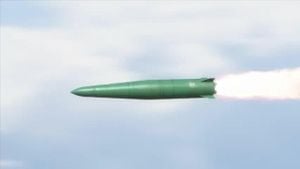The Gaza War entered its 414th day, and recent days have seen Israel intensifying its military operations, not just within the borders of Gaza, but also extending its aggression to Lebanon. The violent clashes have left thousands dead and countless more injured, adding to the already devastating humanitarian crisis.
According to the Palestinian Ministry of Health, the toll from Israeli military actions since the conflict escalated on October 7, 2023, now numbers over 44,176 dead and more than 104,473 injured. This grim milestone was underscored by reports of seven massacres carried out against civilians within just 48 hours, with recent bombings claiming at least 120 lives and injuring 205 others, many of whom remain trapped under rubble or stranded on the streets.
The humanitarian situation is dire, with hospitals across the ravaged region approaching operational shutdowns due to fuel shortages. The Kamal Adwan Hospital, for example, has been targeted multiple times, raising alarms from medical personnel who fear their ability to provide care may cease entirely. If no fuel supplies arrive soon, the health sector’s ability to respond to the crisis will drastically diminish.
On the Lebanese side, attacks from Israeli forces have manifested as airstrikes and ground raids, targeting multiple areas, including the capital, Beirut. Figures released by the Lebanese Ministry of Health indicate the conflict has resulted in at least 3,645 deaths within Lebanon, which includes healthcare professionals and children caught up in the violence.
Hezbollah, the Shiite militant group based in Lebanon, has escalated its military resistance against Israeli incursions, emphatically vowing to confront any attempts by Israeli forces to breach the southern borders. This has compounded the volatility of the situation as Hezbollah's rocket attacks have prompted sirens to sound across northern Israel, including settlements around Tel Aviv. Notably, Hezbollah has claimed to have launched drone strikes on key locations within Israel, targeting sensitive military installations.
On the diplomatic front, U.S. envoy Amos Hochstein has suggested there are prospects for progress toward a ceasefire. Following discussions with Lebanese Parliament Speaker Nabih Berri, he expressed optimism about achieving peace, noting, "We have a real opportunity to end the conflict, and this is the moment to make decisions." Meanwhile, there are signs of discord among the various parties involved, as disagreements over the details of any potential agreement could derail advancements.
Just as Lebanon seemed to lean toward accepting U.S. ceasefire proposals, Israeli Prime Minister Benjamin Netanyahu stated unequivocally on Monday night, "Even if there’s a ceasefire agreement, we will continue our military operations against Hezbollah." He specified the importance of maintaining security and ensuring systematic actions to counteract Hezbollah’s military capabilities, stressing the government’s resolve to prevent the group from regaining strength.
The humanitarian crisis continues to deepen, captivating the United Nations’ attention as calls for increased aid to the Palestinian territories grow louder. British Foreign Secretary David Lammy has highlighted the urgency, declaring the economic situation appalling, especially as winter approaches. During his address, Lammy remarked, "Famine is imminent, and after 400 days of this war, it is completely unacceptable..." These comments echo sentiments from various global leaders who have urged immediate action to alleviate suffering.
At the core of the conflict is the significant historical and political tension between Israel and the Palestinian territories, particularly with the militant group Hamas, which governs the Gaza Strip. The disengagement and continued violence have created complicated dynamics, impeding mediation efforts from nations including Qatar, whose recent decision to suspend mediation has drawn criticism from various quarters.
The constant barrage of violence and retaliatory operations has raised numerous humanitarian concerns, with international agencies warning of deteriorated living conditions. Basic necessities such as food, water, and healthcare remain scarce as the siege continues unabated.
If the war continues to intensify without meaningful diplomatic intervention, prospects for any peaceful resolution seem slim. Discussions around ceasefires and aid deliveries are taking place against the backdrop of continuous military escalation, leaving populations caught between conflicting narratives and the brutal reality of war. The patience of the global community is wearing thin as humanitarian crises overshadow diplomatic engagements.
Experts and analysts continue to monitor the situation closely, as all parties weigh their options and impacts. The conflict is not just another episode of violence but is deeply embedded within the broader geopolitical tensions characteristic of the region.
The hope for peace hinges not only on local leadership but also on international stakeholders’ ability to leverage diplomatic influence over both Israel and Lebanon as they navigate through these tumultuous waters marked by historical grievances. Whether these diplomatic overtures lead to tangible actions remains to be seen. The world watches and waits, but for the people caught within the crosshairs of this enduring conflict, each day brings a fight for survival.



